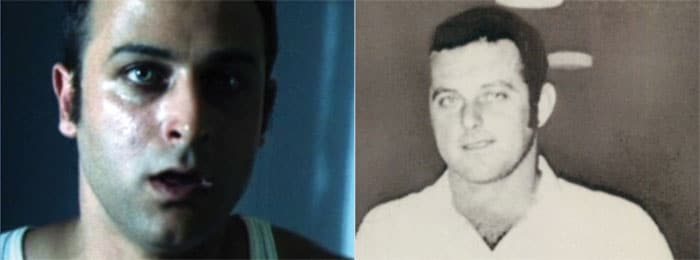 Guri Weinberg (left) portraying his father Moshe (right) in the 2005 film “Munich” (Universal Pictures)
Guri Weinberg (left) portraying his father Moshe (right) in the 2005 film “Munich” (Universal Pictures) When Israeli wrestling coach Moshe Weinberg was murdered along with ten other members of the Israeli Olympic team 50 years ago at the Munich Summer Olympics, he left behind his wife Mimi, and his month-old infant son Guri.
A few years later, as a kindergartener in Israel in the late 1970s, Guri noticed something was amiss between him and his young classmates.
“I saw fathers and mothers coming to pick up their kids and realized then that, wait a minute, something’s not right,” Guri told the Journal. “I understood then that I didn’t have a father.”
As Guri started to understand the concept of not just the loss of a parent, but murder and terrorism, he noticed how it affected his widowed mother.
“I was a kid when this whole thing happened, I didn’t just lose a father, I pretty much lost my mother because it affected her so badly,” Guri said.
Guri is still very much affected by the loss of his father before he was two-months old.
Today, Guri is a successful 50-year-old actor living in Los Angeles, where he and his mother have lived since 1986. Among his credits are the box office hit “The Twilight Saga: Breaking Dawn — Part 2” and multiple episodes of “NCIS: Los Angeles.”
Guri even portrayed his father Moshe in the 2005 Steven Spielberg film, “Munich.”
“It was one of the things that I had the hardest time with growing up — understanding why he fought instead of maybe trying to wait out the whole situation and see if things didn’t turn out well,” Guri said about considering portraying his father in the film. “And so actually walking through in his shoes helped me have that closure for myself.”
But over the years, there has been much disappointment that Guri and other family members of Munich Massacre victims had for German leaders’ mishandling of the aftermath.
By the time Guri learned that the families of the victims were invited to a memorial service in Munich on September 5, it was too late for him to travel to Germany. His mother, Mimi, did attend.
After watching a broadcast of the memorial event, Guri was pleased that the German government accepted responsibility.
“The thing that surprised me the most and was happiest about is that [the German government] fully condemned the attack,” Guri said. “Instead of playing politics, they said who did it, they said that it was a terrorist attack. They said that it was driven by antisemitism. For many years, the German government didn’t want to call the Palestinian terrorists what they were: Palestinian terrorists.”
Guri laments that these days, he notices a disconnect between the Jewish people and the Munich Massacre.
Guri laments that these days, he notices a disconnect between the Jewish people and the Munich Massacre. He says that too many Jews see the Munich Massacre as “more of an Israeli thing than a Jewish thing.”
“Munich was chosen as a particular place for a reason,” Guri said. “When people say, ‘this was an attack on Israelis because of an argument about land,’ they’re deeply mistaken. And they have to understand the players behind it and the line of thinking and the decision to choose the Munich Games after World War II was very, very specific, and it was targeted against Jews.”
Guri still has yet to visit Munich. But in the future he would like to visit the Olympic Village where his father lost his life amongst his countrymen, whose deaths horrified a worldwide audience.
Even when there aren’t widespread memorial events every year among American Jews, every year on the anniversary of the attacks, Guri says the Kaddish for his father.
“That’s pretty much all I do because in the U.S., nobody’s holding any special memorial service like in Israel,” Guri said. “But even in Israel, they just send the delegation from the Israeli Olympic committee and all that with flowers and to the grave. I just go to a synagogue, say the Kaddish and that’s pretty much all I can do.”























 More news and opinions than at a Shabbat dinner, right in your inbox.
More news and opinions than at a Shabbat dinner, right in your inbox.